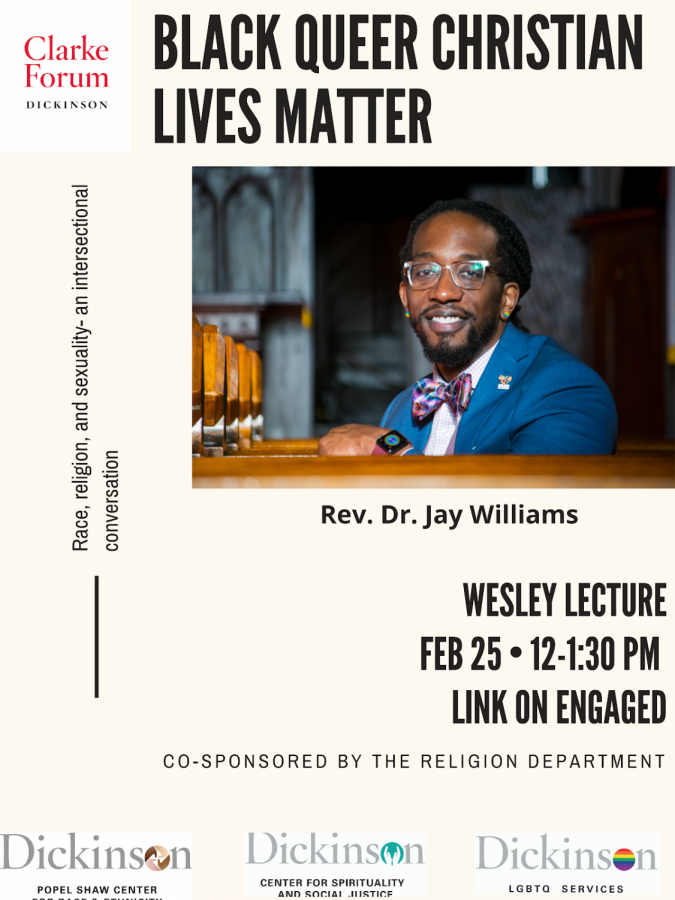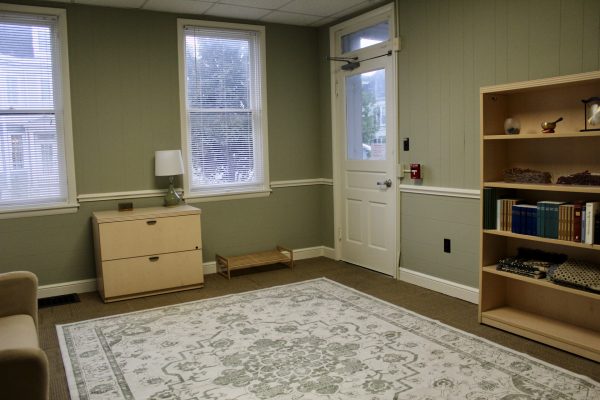2020 Wesley Lecture: Rev. Dr. Jay Williams, Waiting to Exhale
The Clarke Forum for Contemporary Issues and The Center for Spirituality and Social Justice hosted Reverend Dr. Jay Williams as he spoke about his experience as a Black, queer reverend on Thursday, February 256.
This keynote presentation was a part of the annual Wesley Lecture. The Clarke Forum said “The Wesley Lecture grows out of the historical relationship between Dickinson College and the Methodist Church, a relationship that has its roots in the 19th century. The lecture highlights contemporary conversations and controversies in faith communities and in higher education about the importance and role of community, commitment, and service for the education of the citizen-scholar.” This lecture was also co-sponsored by the Office of LGBTQ Services, the Popel Shaw Center for Race & Ethnicity, and the Department of Religion.
Reverend Dr. Jay Williams is the lead pastor at Union Church in Boston, MA, though his path to get to this point in his life was not easy. When Williams was growing up, his loved ones told him that he would make a wonderful pastor. Williams, however, knew there was something that would always be holding him back from that: his sexuality.
“I found out that the Methodist church still teaches that ‘homosexuality is incompatible with Christian teachings’ and that ‘practicing homosexuals are not to be ordained in the United Methodist Church,’” Williams said. Additionally, he said he accepted that he would never become what everyone in his life told him he would be one day.
Flash forward to his college years, when he found Union Church, a church that would welcome LGBTQ+ people with open arms. Even after finding this church, Williams still avoided the path his family wanted him to take by going Pre-Med before working on Wall Street. After three years on Wall Street, Williams finally found himself as a pastor. In 2017, he received his Ph.D. in the study of religion from the Harvard University Graduate School of Arts and Sciences and became his church’s lead pastor a year later.
Williams spoke about the moment he came out to his congregation and the feeling of freedom that came from that moment. He said, “On that Pentecost Sunday, I came out to the congregation… Union had cultivated something in me that allowed me to exhale the pain, inhale the goodness, and to bear witness to the image of God that is within me and to bear witness to how God created me.”
Elana Heffner ’24 enjoyed Williams’ presentation, saying, “I appreciated that worked his own and his family’s stories into the presentation, and his unequivocal, clear point that the association of darkness with evil or sin is racist at its core.”
For the last half of the talk, Williams discussed how this feeling of exhalation, of release, reflects itself into a lot of our lives. He said, “We must take a deep breath to exhale the pains of last year–the dual pandemic of Coronavirus and anti-Black racism which have been nothing short of suffocating.”
The suffocating nature of this past year, Williams notes, is what has made people feel so desperate to gasp for air and to exhale. “For almost a year now, COVID-19, a disease that takes your breath away, has devastated families, ruined life as we once knew it, and then, in May of 2020, the world witnessed a white police officer kneel on a Black man’s neck for 8 minutes and 46 seconds. I can’t breathe.”
Williams closed his presentation by talking about his intersecting identities that have affected his life, and how this year has made people everywhere desperate for air again. According to Williams, this year has also exposed the gruesome reality of white supremacy, and this time it has not gone ignored.
“His point about expanding the definition of queer to include Jesus simply because His way is nonconforming with the world was very compelling, and definitely changed the way I thought about Jesus, Christianity, and the LGBTQ+ community. My greatest takeaway from listening to him was probably the importance of claiming the queerness of following Jesus and using that to stand up against the status quo, and challenge the norms of the world and the church,” Heffner said at the end of Williams’ presentation.
The Wesley lecture, along with all of the other Clarke Forum events, are available for viewing on the Clarke Forum website.




